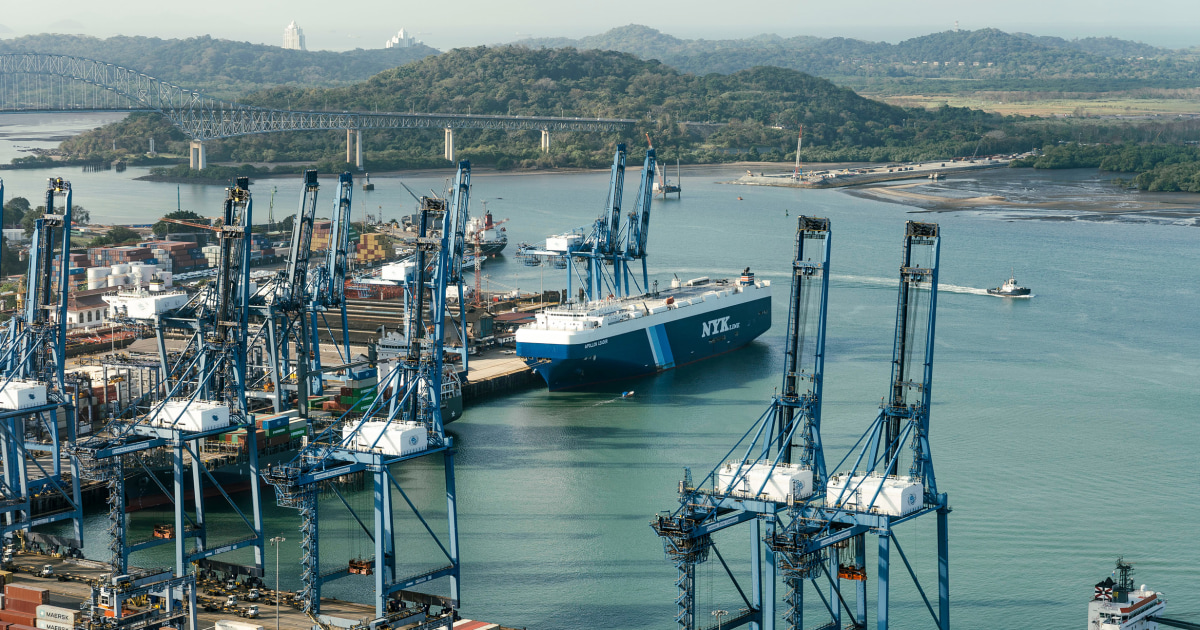U.S. Reclaims Influence: BlackRock’s Bold Move in Panama Canal Ports
In a surprising turn of events, former President Donald Trump recently claimed that the United States is “reclaiming” the Panama Canal. This statement comes on the heels of a significant deal secured by BlackRock, one of the world’s largest investment management firms, to acquire key ports within the Panama Canal. This development is not just a corporate maneuver; it marks a pivotal moment in U.S. foreign policy and economic strategy in the region. The implications of this acquisition are vast, affecting international relations, trade routes, and local economies.
The Panama Canal: A Historical Context
The Panama Canal has long been a strategic asset for global trade, connecting the Atlantic and Pacific Oceans and drastically reducing shipping times for vessels traversing the Americas. Originally completed in 1914, the canal was controlled by the United States until 1999, when it was handed over to Panama under the Torrijos-Carter Treaties. Since then, the canal has served as a vital artery for international commerce, with approximately 14,000 ships passing through each year.
Understanding the significance of the Panama Canal requires recognizing its historical context. The U.S. influence in the region was not solely about controlling trade; it was also about exerting political power and maintaining stability in Central America. The recent acquisition of key ports by BlackRock signals a potential shift in this dynamic, raising questions about the future of U.S. involvement in the area.
BlackRock’s Strategic Acquisition
BlackRock’s move to acquire significant assets in the Panama Canal region reflects a broader trend of private investment in infrastructure, particularly in areas that are critical for global trade. The firm’s deal is expected to enhance its portfolio while also providing essential capital for the development and modernization of the canal’s port facilities.
- Investment in Infrastructure: BlackRock aims to improve the efficiency and capabilities of the ports, which are crucial for accommodating larger vessels and increasing cargo throughput.
- Economic Development: The investment is anticipated to create jobs and stimulate the local economy in Panama, fostering partnerships between U.S. firms and Panamanian businesses.
- Enhanced Connectivity: Improved port facilities could lead to better connectivity for U.S. goods, reducing shipping times and costs, thereby benefiting American consumers and businesses.
This acquisition aligns with the broader strategy of enhancing U.S. economic interests in Latin America, particularly as competition grows from other global powers, notably China. The increased presence of U.S. investment firms like BlackRock in strategic regions underscores a renewed commitment to maintaining influence in international trade routes.
The Political Implications of Reclaiming Influence
The phrase “reclaiming influence,” as used by Trump, resonates deeply in the context of current geopolitical tensions. The U.S. has been increasingly aware of the need to counteract China’s growing influence in Latin America. Chinese investments in infrastructure and trade have surged over the past decade, posing a direct challenge to U.S. dominance in the region.
By securing this deal, the U.S. is not only enhancing its economic footprint but also sending a message to allies and adversaries alike. The investment in Panama can be seen as a strategic move to strengthen ties with Central American nations, fostering goodwill and reinforcing partnerships.
Potential Challenges and Concerns
While the acquisition presents numerous opportunities, it is not without challenges. There are several concerns that stakeholders must navigate:
- Local Resistance: There may be pushback from local communities who fear that foreign investment could lead to exploitation or environmental degradation.
- Political Stability: The political landscape in Panama and Central America is complex, and any instability could threaten the success of such investments.
- Global Economic Conditions: Fluctuations in global markets and trade policies could impact the viability of the investment in the long term.
Addressing these challenges will require a collaborative approach involving local governments, communities, and international stakeholders to ensure that the economic benefits are widely shared and that environmental and social concerns are respected.
The Future of U.S. Influence in Latin America
As BlackRock’s acquisition unfolds, the broader implications for U.S. influence in Latin America will become more apparent. A successful investment could lead to increased American presence in the region, encouraging other firms to follow suit. This could revitalize trade routes, enhance economic cooperation, and create a counterbalance to foreign influences that threaten U.S. interests.
Moreover, the implications of this move extend beyond economics. They touch on issues of national security and international relations. A stronger U.S. presence in Panama could facilitate collaborative efforts on security, drug trafficking, and migration—issues that are of paramount concern to both the U.S. and Central American nations.
Conclusion
In conclusion, BlackRock’s bold move to acquire key ports in the Panama Canal symbolizes a significant shift in U.S. economic strategy and influence in Latin America. As the U.S. seeks to reclaim its position in a rapidly evolving geopolitical landscape, this development reaffirms the importance of the Panama Canal as a strategic asset. While challenges remain, the potential for economic growth, enhanced trade, and strengthened international relations presents an optimistic outlook for the future. The world will be watching closely as this situation develops, and its impact will undoubtedly resonate far beyond the shores of Panama.
See more Business Focus Insider Team

